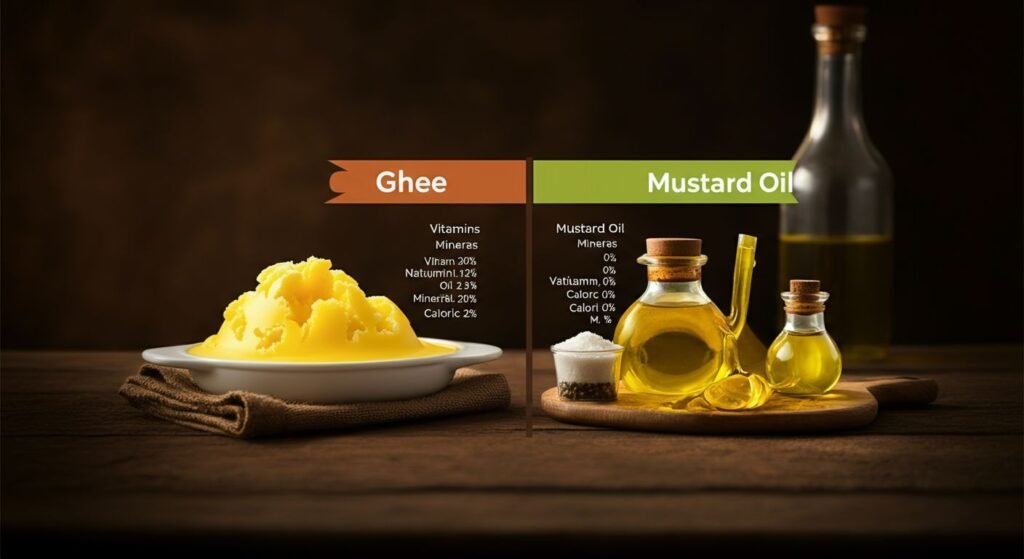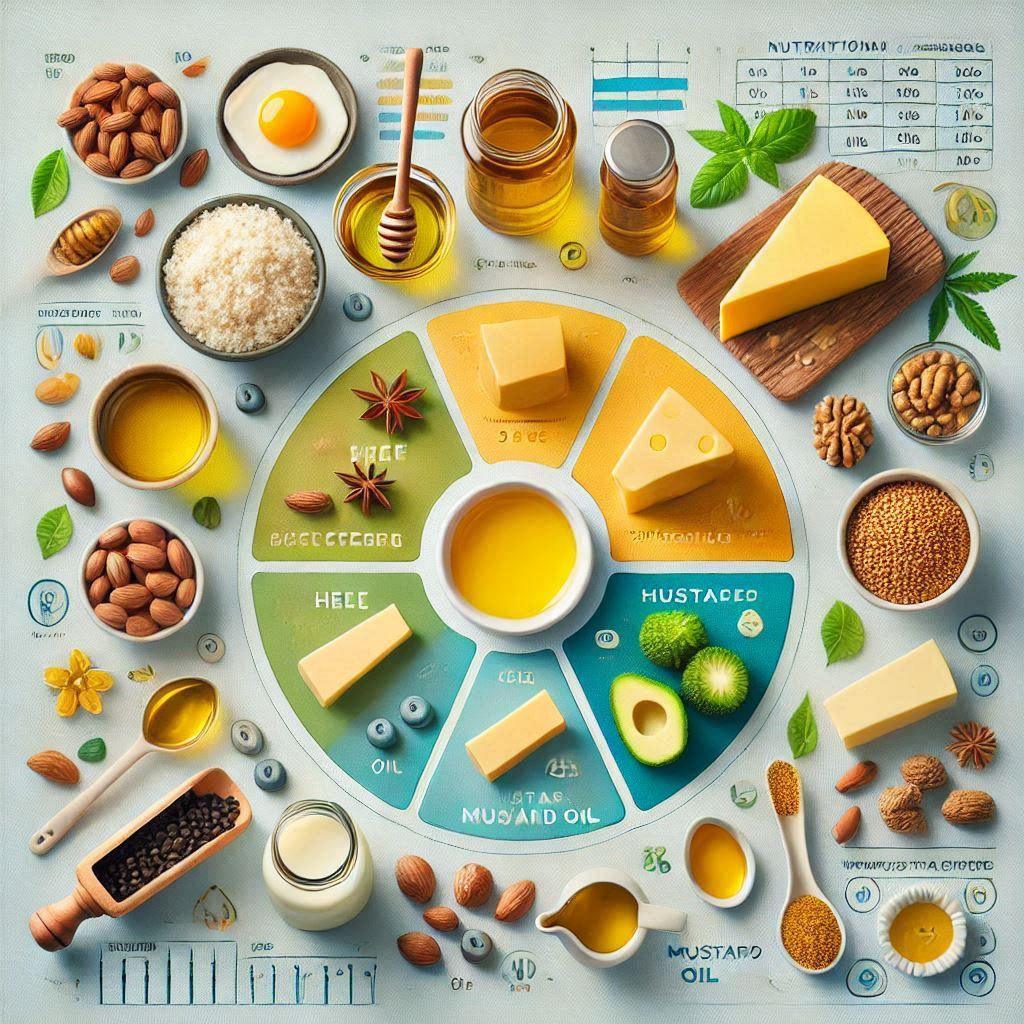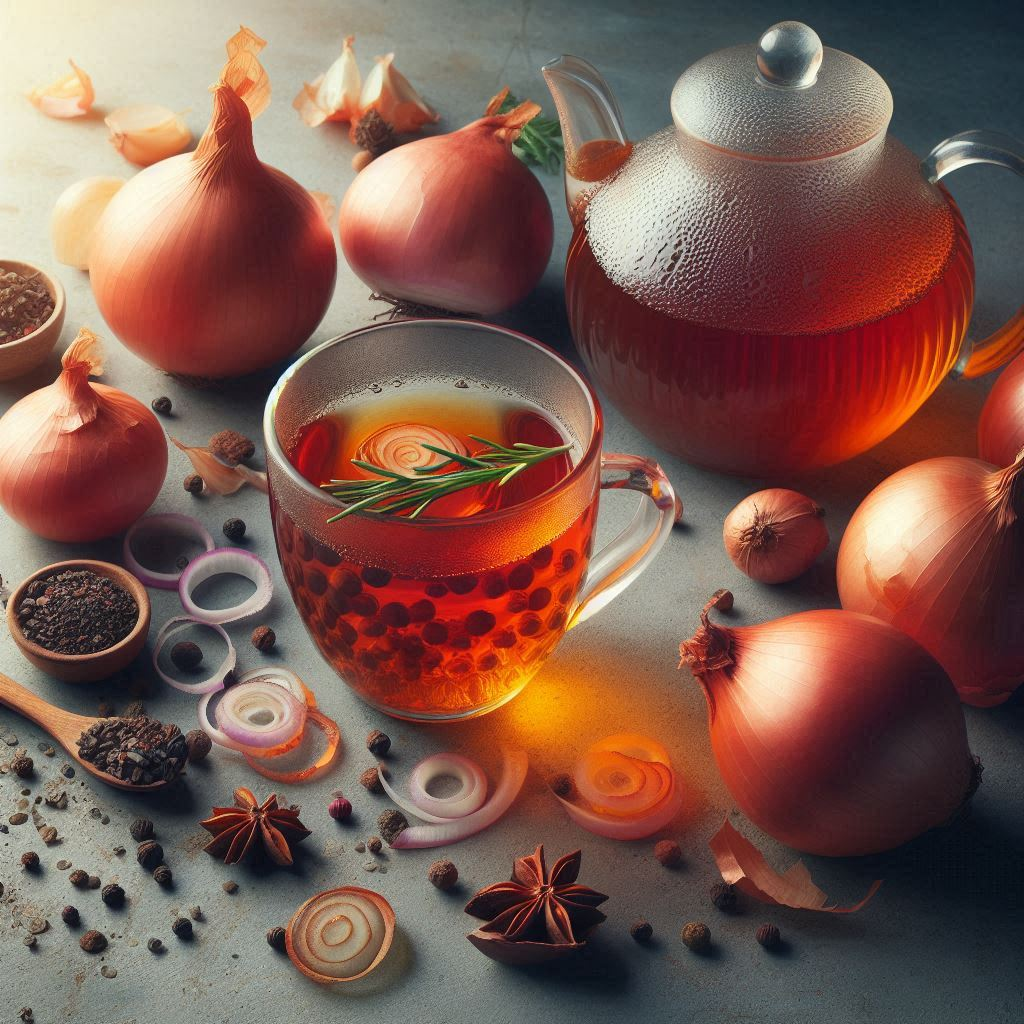Learn the top ten reasons why ghee is superior to mustard oil in terms of the benefits it offers to your health and your cooking.

Introduction
Overview of Ghee and Mustard Oil
Ghee and mustard oil are two popular cooking fats used in various cuisines, particularly in South Asia. Ghee, also known as clarified butter, is made by simmering butter to remove water content and milk solids, leaving behind a rich, golden liquid. It has a high smoke point and a distinct nutty flavor, making it ideal for frying, sautéing, and baking.
Mustard oil, on the other hand, is extracted from mustard seeds and has a pungent, spicy flavor. It is commonly used in Indian, Bangladeshi, and Pakistani cuisines for cooking and pickling. Mustard oil is known for its high smoke point and strong aroma, which adds a unique taste to dishes.
Historical and Cultural Significance
Ghee has been used in Indian cooking and traditional medicine for thousands of years. It is considered a sacred and auspicious ingredient in Hindu rituals and ceremonies. In Ayurveda, ghee is valued for its medicinal properties and is believed to promote digestion, enhance memory, and nourish the body.
Mustard oil also has a long history in South Asian cultures. It is used not only for cooking but also for medicinal purposes and as a massage oil. In traditional medicine, mustard oil is believed to have anti-inflammatory and antibacterial properties. It is also used in various cultural rituals and ceremonies.
Purpose of the Article
The purpose of this article is to compare ghee and mustard oil in terms of their nutritional value, health benefits, and culinary uses. By understanding the differences between these two cooking fats, you can make informed decisions about which one to incorporate into your diet for optimal health and flavor.

Reason 1: Nutritional Value
Nutritional Comparison of Ghee and Mustard Oil
When comparing the nutritional value of ghee and mustard oil, it is important to consider their caloric content, macronutrients, and the vitamins and minerals they provide.
- Caloric Content and Macronutrients: Ghee is high in calories and fat, with approximately 112 calories and 12.7 grams of fat per tablespoon. It contains a mix of saturated, monounsaturated, and polyunsaturated fats. Mustard oil is also high in calories, with around 120 calories and 13.6 grams of fat per tablespoon. It is predominantly composed of monounsaturated and polyunsaturated fats, with a lower percentage of saturated fats compared to ghee.
- Vitamins and Minerals in Ghee: Ghee is a good source of fat-soluble vitamins such as vitamin A, vitamin E, and vitamin K. These vitamins play important roles in maintaining healthy vision, skin, and bones, as well as supporting the immune system.
- Vitamins and Minerals in Mustard Oil: Mustard oil contains essential fatty acids, including omega-3 and omega-6, which are beneficial for heart health. It also provides small amounts of vitamin E, which acts as an antioxidant and helps protect cells from damage.
Why Nutritional Value Matters
- Impact on Overall Health: The nutritional value of cooking fats can have a significant impact on overall health. Choosing fats that provide essential nutrients and support various bodily functions is important for maintaining a balanced diet.
- Choosing the Right Oil for Your Diet: Depending on your dietary needs and health goals, you may prefer one oil over the other. For example, if you are looking to increase your intake of fat-soluble vitamins, ghee may be a better choice. If you are focused on heart health and want to incorporate more omega-3 fatty acids, mustard oil may be more suitable.

Reason 2: Heart Health
Ghee for Heart Health
Ghee has been traditionally used in Indian cooking and is believed to offer several benefits for cardiovascular health.
- Benefits of Ghee for Cardiovascular Health: Ghee contains conjugated linoleic acid (CLA), which has been shown to have anti-inflammatory properties and may help reduce the risk of heart disease. Additionally, the short-chain and medium-chain fatty acids in ghee are easily metabolized by the body and can provide a quick source of energy.
- How Ghee Affects Cholesterol Levels: The impact of ghee on cholesterol levels is a topic of debate. Some studies suggest that ghee may increase levels of high-density lipoprotein (HDL) cholesterol, also known as “good” cholesterol, which can help protect against heart disease. However, ghee is also high in saturated fats, which can raise low-density lipoprotein (LDL) cholesterol, or “bad” cholesterol, if consumed in excess.
Mustard Oil for Heart Health
Mustard oil is known for its potential benefits for heart health, particularly due to its composition of healthy fats.
- Benefits of Mustard Oil for Cardiovascular Health: Mustard oil is rich in monounsaturated and polyunsaturated fats, including omega-3 and omega-6 fatty acids. These healthy fats can help reduce inflammation, lower blood pressure, and improve overall heart health. The presence of alpha-linolenic acid (ALA), a type of omega-3 fatty acid, is particularly beneficial for cardiovascular health.
- How Mustard Oil Affects Cholesterol Levels: Studies have shown that mustard oil can help lower LDL cholesterol levels and increase HDL cholesterol levels. This balance of cholesterol levels can reduce the risk of heart disease and improve overall cardiovascular health.
Reason 3: Digestive Health
Ghee for Digestive Health
Ghee has been used for centuries in traditional medicine for its digestive benefits. It is known to aid digestion and promote gut health.
- How Ghee Aids Digestion: Ghee contains butyric acid, a short-chain fatty acid that is beneficial for the digestive system. Butyric acid helps stimulate the production of digestive enzymes, which can improve the breakdown and absorption of nutrients. Additionally, ghee has a lubricating effect on the digestive tract, making it easier for food to pass through the intestines.
- Benefits of Ghee for Gut Health: Ghee’s anti-inflammatory properties can help soothe the gut lining and reduce inflammation in the digestive tract. This can be particularly beneficial for individuals with conditions like irritable bowel syndrome (IBS) or inflammatory bowel disease (IBD). Ghee also supports the growth of beneficial gut bacteria, which are essential for maintaining a healthy gut microbiome.
Mustard Oil for Digestive Health
Mustard oil is also known for its digestive benefits and has been used traditionally to support digestive health.
- How Mustard Oil Aids Digestion: Mustard oil contains compounds like allyl isothiocyanate, which can stimulate the production of digestive juices and enzymes. This can help improve digestion and nutrient absorption. The pungent nature of mustard oil can also stimulate appetite and promote the secretion of saliva, which is the first step in the digestive process.
- Benefits of Mustard Oil for Gut Health: Mustard oil has antimicrobial properties that can help protect the digestive tract from harmful bacteria and pathogens. This can reduce the risk of infections and support overall gut health. Additionally, mustard oil’s anti-inflammatory properties can help soothe the digestive tract and reduce inflammation.
Reason 4: Weight Management
Ghee for Weight Management
Ghee can be a valuable addition to a weight management plan due to its unique properties.
- How Ghee Supports Weight Loss: Ghee is rich in medium-chain triglycerides (MCTs), which are easily absorbed and metabolized by the body. MCTs can provide a quick source of energy and may help increase fat burning. Ghee also promotes satiety, helping to reduce overall calorie intake and prevent overeating.
- Benefits of Ghee for Metabolism: The healthy fats in ghee can support metabolic function and help maintain stable blood sugar levels. This can prevent energy crashes and reduce cravings for unhealthy snacks. Additionally, ghee’s anti-inflammatory properties can support overall metabolic health.
Mustard Oil for Weight Management
Mustard oil can also play a role in weight management due to its nutritional composition.
- How Mustard Oil Supports Weight Loss: Mustard oil is low in saturated fats and high in monounsaturated and polyunsaturated fats, which can support weight loss. These healthy fats can help reduce inflammation and improve metabolic function. Mustard oil’s pungent flavor can also enhance the taste of healthy foods, making it easier to stick to a balanced diet.
- Benefits of Mustard Oil for Metabolism: The omega-3 fatty acids in mustard oil can support metabolic health and improve insulin sensitivity. This can help regulate blood sugar levels and prevent weight gain. Additionally, mustard oil’s anti-inflammatory properties can support overall metabolic function.
Reason 5: Skin Health
Ghee for Skin Health
Ghee is known for its moisturizing and nourishing properties, making it beneficial for skin health.
- Benefits of Ghee for Skin Hydration and Nourishment: Ghee is rich in essential fatty acids and vitamins, which can deeply hydrate and nourish the skin. It can help improve skin elasticity and reduce dryness, leaving the skin soft and supple. Ghee can also create a protective barrier on the skin, preventing moisture loss.
- How Ghee Helps with Skin Conditions: Ghee’s anti-inflammatory properties can help soothe irritated skin and reduce redness. It can be used to treat conditions like eczema, psoriasis, and dermatitis. Additionally, ghee’s antioxidant properties can protect the skin from damage caused by free radicals and environmental stressors.
Mustard Oil for Skin Health
Mustard oil is also known for its skin benefits and has been used traditionally for skincare.
- Benefits of Mustard Oil for Skin Hydration and Nourishment: Mustard oil is rich in essential fatty acids and vitamin E, which can deeply hydrate and nourish the skin. It can help improve skin texture and reduce dryness, leaving the skin smooth and radiant. Mustard oil can also create a protective barrier on the skin, preventing moisture loss.
- How Mustard Oil Helps with Skin Conditions: Mustard oil’s antimicrobial properties can help protect the skin from infections and promote healing. It can be used to treat conditions like acne, fungal infections, and minor cuts and wounds. Additionally, mustard oil’s anti-inflammatory properties can help soothe irritated skin and reduce redness.
Reason 6: Cooking Versatility
Ghee for Cooking
Ghee is highly versatile in the kitchen due to its high smoke point and rich flavor profile.
- High Smoke Point and Cooking Applications: Ghee has a high smoke point of around 485°F (252°C), making it suitable for high-heat cooking methods such as frying, sautéing, and roasting. This high smoke point ensures that ghee does not break down and produce harmful compounds when exposed to high temperatures.
- Flavor Profile and Culinary Uses: Ghee has a rich, nutty flavor that enhances the taste of various dishes. It is commonly used in Indian cuisine for making curries, rice dishes, and sweets. Ghee can also be used as a spread on bread, a topping for popcorn, or a base for sauces and gravies.
Mustard Oil for Cooking
Mustard oil is also a versatile cooking oil with a high smoke point and distinct flavor.
- High Smoke Point and Cooking Applications: Mustard oil has a high smoke point of around 480°F (250°C), making it suitable for high-heat cooking methods such as frying, sautéing, and deep-frying. Its high smoke point ensures that the oil remains stable and does not produce harmful compounds when heated.
- Flavor Profile and Culinary Uses: Mustard oil has a pungent, spicy flavor that adds a unique taste to dishes. It is commonly used in Indian, Bangladeshi, and Pakistani cuisines for cooking vegetables, meats, and pickles. Mustard oil can also be used as a marinade for grilling or as a finishing oil to add flavor to salads and dips.
Reason 7: Antioxidant Properties
Antioxidants in Ghee
Ghee contains several types of antioxidants that offer various health benefits.
- Types of Antioxidants in Ghee: Ghee is rich in fat-soluble vitamins such as vitamin A and vitamin E, which act as antioxidants. These vitamins help neutralize free radicals and protect cells from oxidative damage.
- Benefits of Antioxidants for Health: The antioxidants in ghee can help reduce inflammation, support immune function, and protect against chronic diseases such as heart disease and cancer. Additionally, antioxidants can promote healthy skin and slow down the aging process.
Antioxidants in Mustard Oil
Mustard oil also contains antioxidants that contribute to its health benefits.
- Types of Antioxidants in Mustard Oil: Mustard oil is rich in vitamin E, which acts as an antioxidant. It also contains phenolic compounds and flavonoids, which have antioxidant properties.
- Benefits of Antioxidants for Health: The antioxidants in mustard oil can help reduce inflammation, support immune function, and protect against chronic diseases. They also promote healthy skin and hair by protecting cells from oxidative damage.
Reason 8: Anti-Inflammatory Effects
Ghee’s Anti-Inflammatory Properties
Ghee contains compounds that have anti-inflammatory effects, making it beneficial for various health conditions.
- Compounds in Ghee That Reduce Inflammation: Ghee contains butyrate, a short-chain fatty acid with anti-inflammatory properties. Butyrate can help reduce inflammation in the gut and support overall digestive health. Ghee also contains conjugated linoleic acid (CLA), which has been shown to reduce inflammation and support immune function.
- Benefits for Conditions Like Arthritis: The anti-inflammatory properties of ghee can help alleviate symptoms of inflammatory conditions such as arthritis. Regular consumption of ghee may help reduce joint pain and stiffness, improve mobility, and support overall joint health.
Mustard Oil’s Anti-Inflammatory Properties
Mustard oil also has anti-inflammatory properties that can benefit various health conditions.
- Compounds in Mustard Oil That Reduce Inflammation: Mustard oil contains omega-3 fatty acids, which have anti-inflammatory effects. These fatty acids can help reduce inflammation in the body and support overall health. Mustard oil also contains allyl isothiocyanate, a compound with anti-inflammatory and antimicrobial properties.
- Benefits for Conditions Like Arthritis: The anti-inflammatory properties of mustard oil can help alleviate symptoms of inflammatory conditions such as arthritis. Regular use of mustard oil in cooking or as a massage oil may help reduce joint pain and stiffness, improve mobility, and support overall joint health.
Reason 9: Immune System Support
Ghee for Immune Health
Ghee is known for its immune-boosting properties, making it a valuable addition to a healthy diet.
- How Ghee Supports the Immune System: Ghee contains butyric acid, which has been shown to support the production of T-cells, a type of white blood cell that plays a crucial role in the immune response. Additionally, ghee is rich in fat-soluble vitamins such as vitamin A and vitamin E, which are essential for maintaining a healthy immune system.
- Benefits of Ghee for Overall Immunity: The antioxidants in ghee help protect the body from oxidative stress and free radical damage, which can weaken the immune system. Regular consumption of ghee can help strengthen the body’s natural defenses and improve overall immunity.
Mustard Oil for Immune Health
Mustard oil also offers immune-boosting benefits due to its unique composition.
- How Mustard Oil Supports the Immune System: Mustard oil contains omega-3 fatty acids, which have anti-inflammatory properties and can help modulate the immune response. The presence of allyl isothiocyanate, a compound with antimicrobial properties, can help protect the body from infections and support immune health.
- Benefits of Mustard Oil for Overall Immunity The antioxidants in mustard oil, such as vitamin E and phenolic compounds, help protect the body from oxidative stress and support overall immune function. Regular use of mustard oil in cooking or as a massage oil can help boost the immune system and improve overall health.
Reason 10: Cultural and Traditional Uses
Traditional Uses of Ghee
Ghee has a rich cultural and traditional significance, particularly in South Asian cuisines and traditional medicine.
- Cultural Significance of Ghee in Various Cuisines: Ghee is a staple in Indian, Pakistani, and Bangladeshi cuisines, where it is used in a variety of dishes, from curries and rice to sweets and desserts. It is also considered a sacred and auspicious ingredient in Hindu rituals and ceremonies.
- Traditional Medicinal Uses of Ghee: In Ayurveda, ghee is valued for its medicinal properties and is used to treat various ailments. It is believed to promote digestion, enhance memory, and nourish the body. Ghee is also used in Ayurvedic massages and as a base for herbal preparations.
Traditional Uses of Mustard Oil
Mustard oil also holds cultural and traditional significance, particularly in South Asian cuisines and traditional medicine.
- Cultural Significance of Mustard Oil in Various Cuisines: Mustard oil is widely used in Indian, Bangladeshi, and Pakistani cuisines for cooking vegetables, meats, and pickles. Its pungent flavor adds a unique taste to dishes and is an integral part of many traditional recipes.
- Traditional Medical Uses of Mustard Oil: Mustard oil is used in traditional medicine for its anti-inflammatory and antimicrobial properties. It is commonly used as a massage oil to relieve muscle pain and improve circulation. Mustard oil is also used in home remedies for colds, coughs, and skin conditions.
Conclusion
Recap of the 10 Amazing Reasons to Choose Ghee or Mustard Oil
In this article, we explored ten amazing reasons to choose ghee or mustard oil:
- Nutritional Value
- Heart Health
- Digestive Health
- Weight Management
- Skin Health
- Cooking Versatility
- Antioxidant Properties
- Anti-Inflammatory Effects
- Immune System Support
- Cultural and Traditional Uses
Encouragement to Incorporate These Oils into Your Diet
Both ghee and mustard oil offer unique health benefits and can be valuable additions to your diet. By understanding their differences and advantages, you can make informed choices about which oil to use in your cooking and daily routine.
Final Thoughts on the Importance of Choosing the Right Oil for Health
Choosing the right cooking oil is essential for maintaining a healthy diet and supporting overall well-being. Whether you prefer the rich, nutty flavor of ghee or the pungent, spicy taste of mustard oil, incorporating these oils into your diet can enhance your meals and provide numerous health benefits. Embrace the versatility and nutritional value of ghee and mustard oil to create delicious and wholesome dishes for yourself and your loved ones.
I hope this detailed information helps you understand the benefits of ghee and mustard oil for immune health and their cultural and traditional uses!



